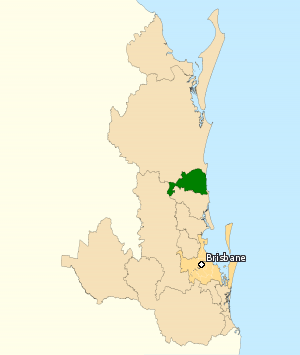Division of Fairfax facts for kids
Quick facts for kids FairfaxAustralian House of Representatives Division |
|
|---|---|

Division of Fairfax (green) within Queensland
|
|
| Created | 1984 |
| MP | Clive Palmer |
| Party | Palmer United |
| Namesake | Ruth Fairfax |
| Electors | 95,467 (2013) |
| Area | 1,036 km2 (400.0 sq mi) |
| Demographic | Rural |
The Division of Fairfax is a special area in Queensland, Australia. It's like a voting district where people choose someone to represent them in the Australian Parliament. This division was created in 1984.
Contents
What is the Division of Fairfax?
The Division of Fairfax is an important area in Queensland, Australia. It is one of the many electoral divisions across the country. People living in this area vote for a person to be their voice in the Australian Parliament.
This division is named after Ruth Fairfax. She was a very important person who started the Country Women's Association. The Fairfax division covers a large part of the Sunshine Coast region. This area is located north of Brisbane.
The Division of Fairfax includes many towns. Some of these towns are Buderim, Coolum, Eumundi, Kenilworth, Mapleton, Maroochydore, Montville, Nambour, Palmwoods, Peregian Springs, Woombye, and Yandina.
Who Represents Fairfax?
The people who represent the Division of Fairfax in Parliament are called Members. They work to make sure the needs of the people in Fairfax are heard. Here is a list of the Members who have represented Fairfax since it was created:
| Member | Party | Term | |
|---|---|---|---|
| Evan Adermann | National | 1984–1990 | |
| Alex Somlyay | Liberal | 1990–2010 | |
| Liberal National | 2010–2013 | ||
| Clive Palmer | Palmer United | 2013-present | |
A Very Close Election
In the 2013 election, the seat for Fairfax was won by Clive Palmer. He is a mining millionaire and the leader of the Palmer United Party. His win was very close!
At first, he won by only 36 votes. After a recount of how votes were shared, his lead became even smaller, just 7 votes. Because the difference was less than 100 votes, the Australian Electoral Commission counted all the votes again. In the end, Clive Palmer won by 53 votes. This shows how every single vote can matter in an election!
Election Results
Images for kids
 | William L. Dawson |
 | W. E. B. Du Bois |
 | Harry Belafonte |


